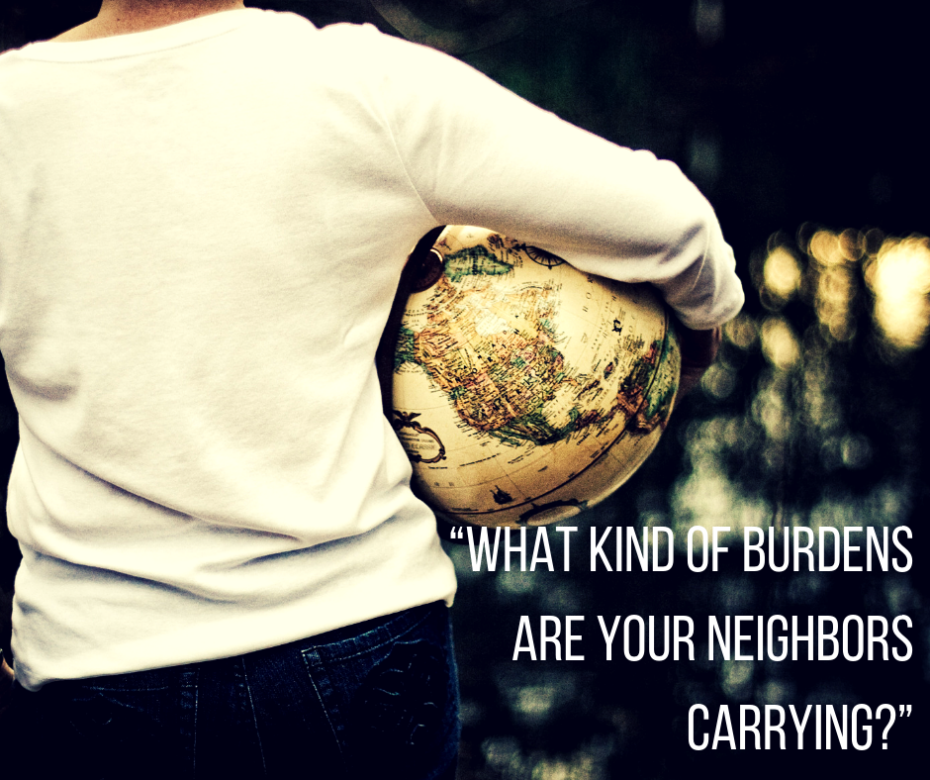I believe that Christian “spirituality” boils down to loving Jesus and loving your neighbor. There are some other elements, to be sure, but that’s the master theme.
And this isn’t an emotional-sentimental love. It’s a practical, get-your-hands-dirty kind of love. It’s a give a hungry person a sandwich, or better yet, give him a job, kind of love. Christians shouldn’t be known for their spiritually useless liturgical calendars (Gal 4:10) or esoteric diets (Rom 14:2, 14), but for their love for one another (John 13:35).
In Galatians 6, Paul calls it burden-bearing. That’s what love is—actually helping people by bearing their burdens. That’s how you fulfill the law of Christ (i.e., the law of love):
Brethren, even if anyone is caught in any trespass, you who are spiritual, restore such a one in a spirit of gentleness; each one looking to yourself, so that you too will not be tempted. Bear one another’s burdens, and thereby fulfill the law of Christ. For if anyone thinks he is something when he is nothing, he deceives himself. But each one must examine his own work, and then he will have reason for boasting in regard to himself alone, and not in regard to another. For each one will bear his own load. The one who is taught the word is to share all good things with the one who teaches him. (Gal 6:1-6)
I see three kinds of burden-bearing in this passage.
First, there is bearing the burden of restoring a Christian caught in sin (v 1). When someone is caught, it’s not time to throw him or her out with the trash. It’s time to bear his burden by seeking to gently restore him to fellowship.
Second, there is bearing the burdens of those around you (v 2). This could be people in and out of the church (cf. v 10). People are hurting in all kinds of different ways. Your job is to love them as the opportunity arises (v 10). I’ll give you an example: there’s a man in my church who has become convicted of this basic truth. He has all kinds of hard edges. He grew up poor. He’s lived his life through back breaking work. If asked, he would admit that he has not lived his life for the Lord. It’s only recently that these Bible truths have deeply impacted him. As part of his business, he employs several young men from very rough backgrounds. Many come straight out of prison. He employs them because he believes in second chances. As their employer, he has gone above and beyond what most people would do. He bought an RV for one young worker to live in (up until then, he was camping in a tent). And he rented a room in a house for another young worker (who was sleeping rough or couch surfing), and is thinking of buying another RV to house him. (He only hesitates because his own house is in disrepair. In fact, it probably has to be torn down. He and his wife have been saving up to build a new one. I counseled him to fix his house first, before buying a second RV, because his primary neighbor is his wife. He should love her first.) My point is there are so many burdens around you, it’s usually not a matter of choosing between doing good or bad, but of choosing between two different goods. Whose burden will you bear?
Third, there is sharing in the burden of ministry (v 6). Paul taught that if you have benefited from a Bible teacher, you should share good things with that teacher (i.e., you should support him financially so he can keep on teaching). On that note, I am very grateful for the donors who support GES. We have a handful of major donors. We mostly have little donors. Again and again, I’ve seen people step up and give to make our ministry possible. For example, we recently had a Charlotte Regional Conference. In one of my talks, I joked that thanks to Bob’s cheapness, we can put on regionals for relatively little and make them free of charge. Afterward, an unassuming gentleman approached me and asked how much it cost to put on the conference. I gave him a round number. Later that day he handed me a check for the whole amount! One man paid for the whole conference! And do you know what? He isn’t the first to do that! In several of our regionals, one donor has stepped up to pay the whole thing. They’re doing exactly what Paul said to do—they are sharing financially with those who teach the Word.
Burden-bearing is not about eternal salvation. Jesus bore the burden of your salvation on the cross so that He could give you eternal life as a free gift through faith in Him (Eph 2:8-9). That’s precisely why you can dispense with the salvation-by-works gimmickry of most religions and concentrate your time and energy on sharing the burdens of those around you.
What kind of burdens are your neighbors carrying?


